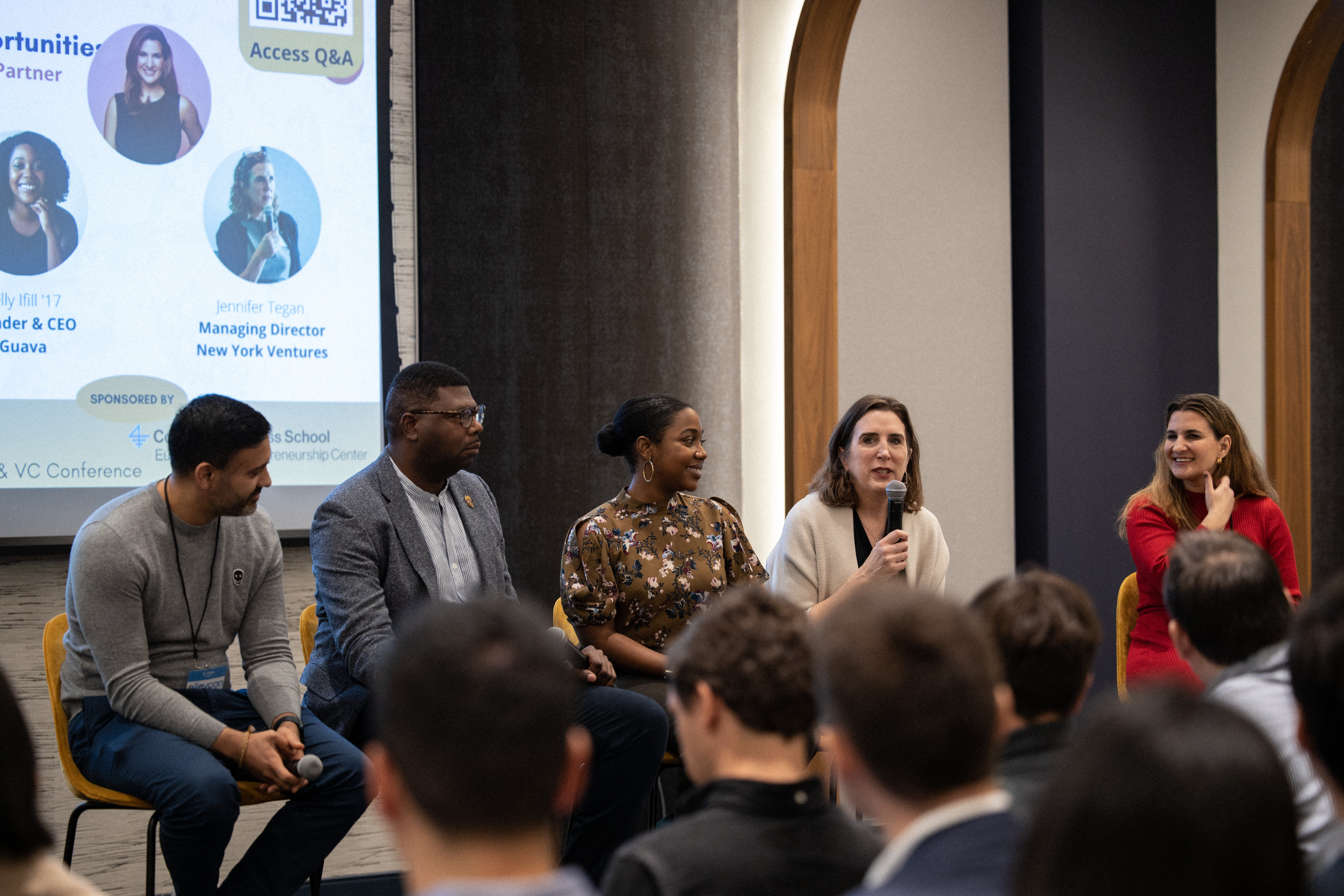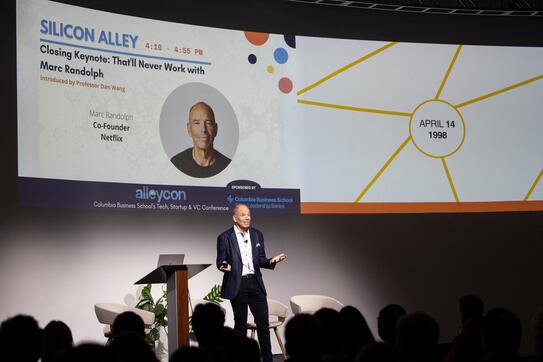Alleycon, Columbia Business School's annual student-run technology conference, returned to an in-person format on February 17 with a daylong series of panels, speeches, and keynotes covering such topics as generative AI, digital health, climate, venture capital, and decentralized finance.
The Eugene M. Lang Entrepreneurship Center at Columbia Business School, the Sanford C. Bernstein & Co. Center for Leadership & Strategy and Ethics, the CBS Venture Capital Club, and the CBS Fintech and Blockchain Club each sponsored panels at the event, which was held at Convene in Lower Manhattan.
The day's sessions kicked off with opening remarks from CBS Dean Costis Maglaras, followed by a keynote from Jaleh Bisharat, co-founder and CEO of NakedPoppy, a clean beauty company that curates clean, safe, and effective beauty brands.
Bisharat stressed the importance of creating a positive work environment for the teams you lead. When managing a team, she suggested asking the following questions:
- Are we externally focused?
- Do we enjoy healthy debate?
- Are we happy on Sunday night or are we dreading Monday morning?
Other Leadership & Strategy insights from Bisharat included:
- “I often go to bed at night thinking, 'Did I learn something today?' If so, what was it?”
- “No matter how much seniority you achieve over the course of your career, never be above learning.”
- “If your competition is learning faster than you, you're falling behind.”
Panel discussions at Alleycon covered a wide range of topics, including national security, the outlook for generative AI, venture capital, and how to build an inclusive startup in New York City.
The panel “Generative AI: Current State, Future Applications, and Impacts on Business and Society” included Cristóbal Valenzuela, founder of Runway; Bianca Martin, technical chief of staff at OpenAI; Grace Isford, partner at Lux Capital; and panel moderator CBS Professor Dan Wang. They discussed the latest developments in AI, the societal and ethical issues raised by the new technology, and the challenges and opportunities ahead.
Notable comments included:
- Cristóbal Valenzuela: AI has “crossed the mom threshold,” meaning that now, even moms are using it. “The models are getting better, and people finally understand the potential. It has been in development for the last eight years, but there's still a long way to go. The models need to improve; the quality needs to get better.”
- Bianca Martin: “We had no idea [ChatGPT] would grow and gain this much attention and discussion. But that's good because we are now having crucial conversations as a society about how these technologies should be used.”
The panelists also addressed the societal and ethical issues raised by AI:
- Bianca Martin: It's important to expose the public to the technology and get them acclimated now that the stakes are low and the impact is minimal.
- Grace Isford: On the challenge of managing transparency in industries like financial services, she noted, “It's a societal question: In some cases, such as identifying fraud, we'll need a lot of human assistance in the short term.”
On managing the significant draw on natural resources:
- Bianca Martin: There's a dimension of impact on the environment that AI touches on, she said. “Companies should be looking at how to offset impacts; it's our responsibility.”
Later, at the panel “NYC Tech Startup Ecosystem: Current State and Future Opportunities,” which was moderated by Rachel ten Brink '01, general partner and co-founder at Red Bike Capital, panelist Kelly Ifill '17, founder and CEO of Guava, a digital banking and community platform, advised would-be founders to use their networks as much as possible: “Tell as many people as you can about what you're working on. Especially women—don't wait until it's perfect.”
Ifill was joined on the panel by KJ Singh '11, managing director at the Comcast NBCUniversal LIFT Labs Accelerator; Jonté Harrell '09, managing partner at Ossian Capital; and Jennifer Tegan, managing director of New York Ventures at Empire State Development.

During the midday keynote, Jim Keyes '80, former CEO of Blockbuster and 7-Eleven Global, told Alleycon attendees, “The more you go through, the stronger you get,” while discussing the highs and lows he experienced during his time as the head of two major household brands. “Change is good for you,” he emphasized.
The afternoon panel session, “Crypto: The Rise, the Fall, and What's Next,” presented by Columbia Business School's Briger Family Digital Finance Lab, included Carra Wu, partner at Andreessen Horowitz; Austin Campbell, former chief risk officer at Paxos National Trust; Theo Liebowitz, venture lead at Uniswap Labs Ventures; and CBS Professor Ciamac Moallemi. The panel discussed the state of regulation for crypto and potential future use cases for the technology.
For non-crypto MBA students looking to get into the space, the panelists suggested several potential entry points, including governance, business development, compliance, and legal. As regulation ramps up, there will be strong demand for workers who have a background in the field, said Campbell, adding that there's a strong need to educate the public about the technology's uses and benefits.
During the Climate Technology Roundtable, Sarah Sclarsic, co-founder and managing partner at Voyager, said, “There has never been a better time to build or invest in climate tech.” Capital, technology, and talent are three elements driving the change, and those three areas “have come up in a big way” over the past few years, she added.
The closing keynote speech was delivered by Marc Randolph, co-founder of Netflix. According to Randolph, all entrepreneurs need just three things to succeed: tolerance for risk, an idea, and confidence. Describing how the streaming giant got its start in the late '90s, he drove home the point that generating new ideas is vital to success in business.
Randolph told the story of how Netflix was born:
- He had been laid off during a merger, but the company needed him to stay on for another six months. Randolph and a colleague would carpool to work every day for the next six months, and they spent the entire commute from their neighborhood in Santa Cruz to their office in Sunnyvale spitballing ideas.
- Randolph would pitch ideas every day until the idea for a video rental service popped into his head.
- The first day the site went live, 200 orders were placed and the site crashed. Randolph's expectations were blown away, as 200 orders were projected for the entire first month of sales.
- Now, Netflix has 200 million subscribers. It produces its own shows and movies, and even has claims over the phrase, “Netflix and chill.”
“Success is proportional to how many ideas you try,” Randolph said, adding that founders need to build a system, a process, and a culture that promotes new ideas.
His other insights for would-be entrepreneurs included:
- “You need a tolerance for risk and an idea.”
- “Some of the best entrepreneurs I know are not the A students or the B students; they're the C students. They are the ones who have been taking risks their entire career.”
- “Risk is being willing to start down a trail without seeing around the corner.”
- “You'll need hundreds of ideas because you never know which one will make all the difference.”
